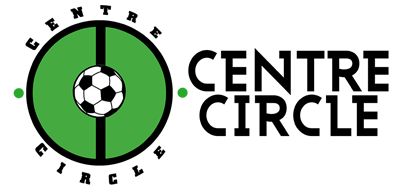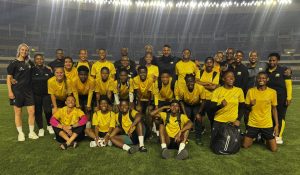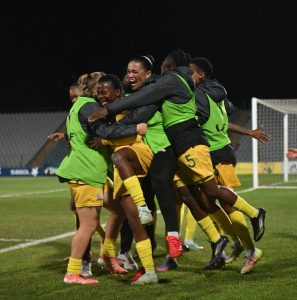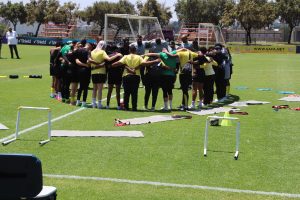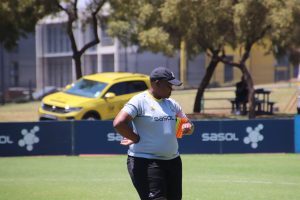Four Banyana Banyana players have been named among the best performers at the 2023 FIFA Women’s World Cup that recently ended in Australia and New Zealand.
It’s already a known fact that players captured the hearts of the nation and the football world with their brave and exciting performance.
The month-long tournament had South Africans waking up in the wee hours of the morning to watch their heroines, who did not disappoint by not only notching their first win in a World Cup but also managed to get out of their group to the Round of 16 – history in the making living up to the belief that they are #notdoneyet.

Despite playing only four matches at the tournament, Banyana Banyana had some impressive stats at the competition – in some instances competed with those who went further that the second round.
A lot of factors can be taken into consideration as to what helped Desiree Ellis’ charges to achieve this feat – more so if you cast your mind back to their maiden tournament where they lost all three matches (vs Spain, China and Germany) and returned home pointless.
Without a professional league, and with the bulk (16) of the squad coming from the Hollywoodbets Super League and six from abroad, while one player was one unattached (Noxolo Cesane), Banyana Banyana needed to get their preparations spot on this time around as they knew what to expect on the global stage.
But they encountered challenges shortly before departure, including a bonus dispute with the Football Association (SAFA) that had them missing crucial training sessions.

Despite the setback, they spent a long time in camp which was demanding and draining, but gave coaches time and space to work on tactical elements and amalgamation of players.
The training programme followed was more elite – very different to what they were accustomed to at their clubs due to several factors as some are working and others attend school.
With a minimum of six training sessions a week, managed by a physical trainer, a biokineticist and the coaches, the players were able to improve on their overall aerobic endurance. In addition, the majority of the team had been to the Olympic Games, the 2019 FIFA Women’s World Cup and the 2022 CAF Women’s Africa Cup of Nations – and carried a lot of experience. Over and above that, there was a hunger and desire to do well and make history for themselves and the country.
As part of their arsenal, the South Africans also travelled with a Psychologist that played a crucial role as she worked on the mindset of individuals and the collective.

Banyana Banyana spent about 60 days camp in total – which is a long time for a group to be together – but the results justified the work done during that period.
They beat Italy (3-2), drew against Argentina (2-2) and lost to both Sweden (1-2) and the Netherlands (2-0) – earning themselves four points in the process, a great improvement from the last edition in France four years ago as they continue to #LiveTheImpossible.
Twenty players were used for the 2023 tournament, with only the two goalkeepers Andile Dlamini and Kebotseng Moletsane and defender Fikile Magama not getting on the field.
Of the 20, only eight started and played in all the matches (Kaylin Swart, Lebohang Ramalepe, Bongeka Gamede, Bambanani Mbane, Linda Motlhalo, Jermaine Seoposenwe, Hilda Magaia and Thembi Kgatlana).

Despite playing only four matches, a quartet from this last group features prominently in a FIFA report on player stats regarding speed, dribbling, saves, tackles and many more.
USA-based Kgatlana is named in the top 10 of the Most Successful dribbles in the tournament with six overall, level with Morocco’s Sakina Ouzraoui, while Spain’s Salma Paralluelo, who was named the Best Young Player of the Tournament, was top of the list with 10 successful dribbles.
The African continent featured prominently in the most successful dribbles per 90 minutes – with Zambia (1.5 – Racheal Kundananji), Morocco (1.4 – Ouzraoui) and South Africa (1.4 – Kgatlana) all mentioned in the report.

Most successful dribbles
10 – Salma Paralluelo (Spain)
7 – Jessica Silva (Portugal)
7 – Johanna Kaneryd (Sweden)
7 – Jenni Hermoso (Spain)
7 – Caitlin Foord (Australia)
6 – SAKINA OUZRAOUI (MOROCCO)
6 – Mayra Ramirez (Colombia)
6 – Olga Carmona (Spain)
6 – Nerilia Mondesir (Haiti)
6 – THEMBI KGATLANA (SOUTH AFRICA)
Most successful dribbles per 90 minutes
1.8 – Salma Paralluelo (Spain)
1.7 – Nerilia Mondesir (Haiti)
1.6 – Jule Brand (Germany)
1.6 – Khadija Shaw (Jamaica)
1.5 – RACHEAL KUNDANANJI (ZAMBIA)
1.5 – Lisa Boattin (Italy)
1.4 – Kathrine Kuhl (Denmark)
1.4 – SAKINA OUZRAOUI (MOROCCO)
1.4 – THEMBI KGATLANA (SOUTH AFRICA)
1.3 – Jody Brown (Jamaica)
* Only includes players who played 270 minutes or more

Spain’s Teresa Abelleira was the busiest when it came to creating chances – 24 in total.
In the per 90 minutes category Nigeria’s Tony Payne made 2.0, while Abelleira is sitting on 3.3.
Most chances created
24 – Teresa Abelleira (Spain)
14 – Jenni Hermoso (Spain)
13 – Alex Greenwood (England)
12 – Aoba Fujino (Japan)
11 – Aitana Bonmati (Spain)
10 – Salma Paralluelo (Spain)
10 – Mariona Caldentey (Spain)
10 – Rafaelle Santos (Colombia)
10 – Catalina Usme (Colombia)
9 – Selma Bacha (France)
Most chances created per 90 minutes
3.3 – Teresa Abelleira (Spain)
2.8 – Aoba Fujino (Japan)
2.4 – Kerolin (Brazil)
2.3 – Frida Maanum (Norway)
2.2 – Katherine Alvarado (Costa Rica)
2.2 – Leicy Santos (Colombia)
2.2 – Selma Bacha (France)
2.0 – TONI PAYNE (NIGERIA)
2.0 – Mina Tanaka (Japan)
1.9 – Vicki Becho (France)
* Only includes players who played in 270 minutes or more

When it came to the most attempts at goal, Kgatlana was a menace to goalkeepers and defenders alike as she unleashed 20 shots and had a return of two goals. Interestingly, Lieke Martens of the Netherlands was one shot ahead with a single goal to her name. Also ahead of Kgatlana was Paralluelo as well as England’s Alessia Russo, while the dSpanish duo of Aitana Bonmati (Best Player of the Tournament) and Jenni Hermoso (captain) were just behind the South African overall.
But the Racing Louisville forward beat the rest of the field in the per 90 minutes stats, with 4.6 attempts at goal.
Most attempts at goal
21 shots, 1 goal – Lieke Martens (Netherlands)
20 shots, 2 goals – Salma Paralluelo (Spain)
20 shots, 3 goals – Alessia Russo (England)
20 SHOTS, 2 GOALS – THEMBI KGATLANA (SOUTH AFRICA)
20 shots, 3 goals – Aitana Bonmati (Spain)
19 shots, 3 goals – Jenni Hermoso (Spain)
18 shots, 4 goals – Kadidiatou Diani (France)
18 shots, 4 goals – Jill Roord (Netherlands)
17 shots, 1 goal – Esther Gonzalez (Spain)
17 shots, 3 goals – Alba Redondo (Spain)
Most attempts at goal per 90 minutes
4.6 – THEMBI KGATLANA (SOUTH AFRICA)
4.4 – Alex Popp (Germany)
4.2 – Mina Tanaka (Japan)
4.0 – Sophie Roman Haug (Norway)
3.8 – Alex Morgan (USA)
3.6 – Jill Roord (Netherlands)
3.6 – Salma Paralluelo (Spain)
3.6 – Lieke Martens (Netherlands)
3.6 – Alba Redondo (Spain)
3.4 – Alessia Russo (England)
* Only includes players who played 270 minutes or more

While they played only three games in the tournament after failing to get out their group, debutants Zambia had the fastest player in the competition – Racheal Kundananji, who registered a top speed of 33.2 km/h, while Kgatlana was not too far off on 33.0km/h.
Interestingly none of the quarterfinalists had their players featured in this category.
Fastest top speeds
33.2 KM/H – RACHEAL KUNDANANJI (ZAMBIA)
33.0 km/h – Kalyssa Van Zanten (Jamaica)
33.0 km/h – Lynn Williams (USA)
33.0 KM/H – THEMBI KGATLANA (SOUTH AFRICA)
33.0 km/h – Florencia Bonsegundo (Argentina)
32.9 km/h – Caroline Graham Hansen (Norway)
32.9 km/h – Wu Chengshu (China PR)
32.9 km/h – Cecilia Salvai (Italy)
32.9 km/h – Melchie Dumornay (Haiti)
32.9 km/h – Mariana Larroquette (Argentina)

No player made more tackles than co-hosts Australia’s Katrina Gorry with 59 overall, while Nigeria’s Christy Ucheibe, who runs out for Benfica in Portugal, made 36.
When it came to per match situation Gorry was shunted into second place by Jackie Groenen of the Netherlands, with South Africa’s Bongeka Gamede (UWC) also come into the reckoning on 7.0 while Ucheibe was slightly above on 7.4.
Tackles made
59 – Katrina Gorry (Australia)
44 – Jackie Groenen (Netherlands)
44 – Georgia Stanway (England)
43 – Angeldal Filippa (Sweden)
40 – Grace Geyoro (France)
37 – Lucy Bronze (England)
36 – CHRISTY UCHEIBE (NIGERIA)
35 – Keira Walsh (England)
35 – Ona Batlle (Spain)
33 – Lorena Bedoya (Colombia)
Tackles made per 90 minutes
7.9 – Jackie Groenen (Netherlands)
7.8 – Katrina Gorry (Australia)
7.6 – Grace Geyoro (France)
7.4 – CHRISTY UCHEIBE (NIGERIA)
7.2 – Danielle van de Donk (Netherlands)
7.0 – BONGEKA GAMEDE (SOUTH AFRICA)
6.9 – Filippa Angeldal (Sweden)
6.9 – Sandie Toletti (France)
6.6 – Kathrine Kuhl (Denmark)
6.3 – Denise O’Sullivan (Republic of Ireland)
* Only includes players who appeared in 270 minutes or more

Mamelodi Sundowns Ladies’ Bambanani Mbane also had a hectic day at the office, defending her goals with 23 blocks in total – level with Ucheibe. Ona Batlle of Spain was top of the pile with 34 blocks.
Judging from a 90 minutes match, Mbane was top of the group on 5.9, level with Vietnam’s Thi Thu Tran, while Ucheibe was down the list on 4.7.
Blocks made
34 – Ona Batlle (Spain)
32 – Elin Rubensson (Sweden)
30 – Lucy Bronze (England)
29 – Georgia Stanway (England)
28 – Jonna Andersson (Sweden)
26 – Johanna Kaneryd (Sweden)
25 – Filippa Angeldal (Sweden)
23 – CHRISTY UCHEIBE (NIGERIA)
23 – BAMBANANI MBANE (SOUTH AFRICA)
23 – Steph Catley (Australia)
Blocks mate per 90 minutes
5.9 – Thi Thu Tran (Vietnam)
5.9 – BAMBANANI MBANE (SOUTH AFRICA)
5.7 – Danielle van de Donk (Netherlands)
5.3 – Thi Diem My Le (Vietnam)
5.1 – Thea Bjelde (Norway)
5.0 – Sophia Braun (Argentina)
4.8 – Fabiola Villalobos (Costa Rica)
4.8 – Elin Rubensson (Sweden)
4.7 – CHRISTY UCHEIBE (NIGERIA)
4.7 – Katherine Alvarado (Costa Rica)
* Only includes players who appeared in 270 minutes or more

Goalkeeper Kaylin Swart of JVW in the Hollywoodbets Super League also came in for some praise with 14 saves in total, one less than Goalkeeper of the Tournament, Mary Earps of England as well as Daphne van Domselaar of the Netherlands.
But leading the pack was Costa Rica’s Daniela Solera with 22 saves.
The Central American goalminder was again ahead when it came to the 90-minute match contest with 6.6 while was Swart in fifth place with 3.1 saves.
Saves
22 – Daniela Solera (Costa Rica)
21 – Zecira Musovic (Sweden)
18 – Olivia McDaniel (Philippines)
18 – Mackenzie Arnold (Australia)
17 – Rebecca Spencer (Jamaica)
15 – Tran Thi Kim Thanh (Vietnam)
15 – Daphne van Domselaar (Netherlands)
15 – Mary Earps (England)
14 – KAYLIN SWART (SOUTH AFRICA)
13 – Kerly Theus (Haiti)
Saves per 90 minutes
6.6 – Daniela Solera (Costa Rica)
5.4 – Olivia McDaniel (Philippines)
3.9 – Rebecca Spencer (Jamaica)
3.8 – Kerly Theus (Haiti)
3.1 – KAYLIN SWART (SOUTH AFRICA)
3.0 – Zecira Musovic (Sweden)
2.9 – Yenith Bailey (Panama)
2.5 – Gaelle Thalmann (Switzerland)
2.5 – Daphne van Domselaar (Netherlands)
2.4 – Courtney Brosnan (Republic of Ireland)
* Only includes players who appeared in 270 minutes or more

It is not surprising that only that the teams that went beyond the quarterfinals will feature prominently in the most distance covered category, but interestingly England is not represented.
Attacking midfielder Jenni Hermoso was the engine of the 2023 Women’s World Cup Champions and covered a distance of 78.4 km, closely followed Australia’s Steph Catley on 77.2 km.
But per match, Japan was head and shoulders above the rest, led by Hinata Miyazawa, the Adidas Golden Boot Winner, on 11.4 km, alongside her compatriots Mina Tinaka and Fujino Aoba on 11.3 km and 11.2 km respectively. Morocco’s Elodie Nakkach was also a workaholic, covering a distance of 11.0 km.
Most distance covered
78.4 km – Jenni Hermoso (Spain)
77.2 km – Steph Catley (Australia)
77.0 km – Caitlin Foord (Australia)
77.0 km – Teresa Abelleira (Spain)
76.4 km – Kyra Cooney-Cross (Australia)
74.8 km – Katrina Gorry (Australia)
74.0 km – Irene Paredes (Spain)
71.8 km – Ellie Carpenter (Australia)
70.9 km – Amanda Ilestedt (Sweden)
70.8 km – Mary Fowler (Australia)
Most distance covered per 90 mins
11.4 km – Hinata Miyazawa (Japan)
11.3 km – Mina Tinaka (Japan)
11.2 km – Fujino Aoba (Japan)
11.0 KM – ELODIE NAKKACH (MOROCCO)
11.0 km – Danielle van de Donk (Netherlands)}
10.9 km – Coumba Sow (Switzerland)
10.9 km – Yui Hasegawa (Japan)
10.8 km – Filippa Angeldal (Sweden)
10.8 km – Kathrine Kuhl (Denmark)
10.7 km – Geraldine Reuteler (Switzerland)
* Only includes data when a player played at least 75 minutes in a match

When it comes to the passing game, newly-crowned World Champions Spain had five players on the list of the top 10, while England had four.
The latter was led by Alex Greenwood with an impressive 568 completed passes overall, and compatriot Millie Bright breathing down her neck on 476. Not too far off was the trio of Spain, Ona Batlle, Irene Paredes and Abelleira with 474, 469 and 461 respectively. Greenwood almost missed the tournament after an ankle injury shortly before the final squad was announced, but recovered in time to make the list.
Despite not getting out of their group, two-time champions Germany led the passing game within the 90 minutes – Kathrin Hendrich on 80.9 completed passes, followed by Greenwood on 68.6.
Most passes completed
568 – Alex Greenwood (England)
476 – Millie Bright (England)
474 – Ona Batlle (Spain)
469 – Irene Paredes (Spain)
461 – Teresa Abelleira (Spain)
373 – Nathalie Bjorn (Sweden)
369 – Jess Carter (England)
340 – Jenni Hermoso (Spain)
332 – Lucy Bronze (England)
327 – Aitana Bonmati (Spain)
Most passes completed per 90 minutes
80.9 – Kathrin Hendrich (Germany)
68.6 – Alex Greenwood (England)
66.1 – Maren Mjelde (Norway)
63.7 – Ona Batlle (Spain)
63.1 – Teresa Abelleira (Spain)
58.7 – Mariona Caldentey (Spain)
57.5 – Millie Bright (England)
57.1 – Irene Paredes (Spain)
56.9 – Elisa de Almeida (France)
56.1 – Vilde Boe Risa (Norway)
* Only includes players who played 270 minutes or more
By Matlhomola Morake
